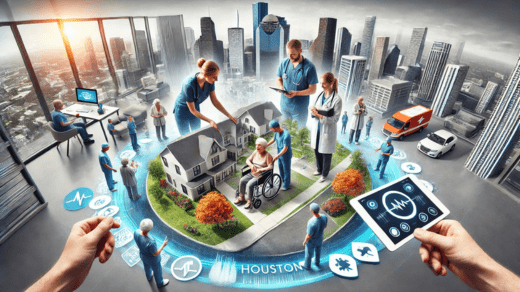As the sun sets over Houston, a city synonymous with resilience and innovation, a quiet revolution is unfolding within its healthcare landscape. Elder care in this sprawling metropolis is undergoing a transformative shift, as families and professionals alike seek new ways to enhance the quality of life for their aging loved ones. With an ever-growing senior population — set to double by 2040 — Houston is at the forefront of pioneering approaches that challenge traditional models of care. From high-tech solutions employing artificial intelligence to community-driven initiatives focused on social engagement, the methods being adopted here are as diverse as the residents themselves.
This article delves into the innovative strategies reshaping elder care in Houston, exploring how cutting-edge technology and compassionate community programs are redefining what it means to support our elders. We will uncover success stories from local organizations that are breaking barriers and setting benchmarks for others to follow. As we navigate this evolving landscape together, we invite you to discover how these forward-thinking practices not only address immediate needs but also foster a stronger sense of belonging and purpose among seniors—a testament to Houston’s commitment to caring for all generations.
Overview of Elder Care Innovations
In Houston, Texas, the landscape of elder care is increasingly shaped by innovative technologies that enhance the quality of life for seniors. Cutting-edge solutions such as remote health monitoring systems and smart home devices are not only improving safety but also fostering independence among older adults. These advancements allow families and caregivers to maintain a connection with their loved ones in ways that were unimaginable just a decade ago. For instance, wearable health devices can track vital signs in real-time and prompt immediate medical response if necessary, minimizing hospital visits while delivering peace of mind.
Moreover, community initiatives in Houston are harnessing artificial intelligence to create personalized care plans that cater specifically to each individual’s needs. Virtual reality experiences not only boost cognitive engagement but also serve therapeutic purposes by alleviating feelings of loneliness often experienced by seniors. This thoughtful blend of technology and human interaction is redefining traditional elder care paradigms, showcasing how innovation can bridge generational gaps while enhancing overall wellness. As these practices gain traction, they promise to transform the fabric of elder care across Texas and beyond, setting new standards for compassion-driven healthcare.
Technology Advancements Enhancing Elderly Care
As the global population ages, innovative technologies are redefining elderly care in profound ways. Smart home systems equipped with sensors can detect unusual patterns in daily activities, alerting caregivers or emergency services when necessary. These advancements create a safety net for seniors living independently, allowing them to maintain their autonomy while providing peace of mind to families and caregivers. Additionally, wearable devices monitor health metrics such as heart rate, mobility, and even hydration levels, enabling proactive interventions that were previously impossible.
Telehealth solutions have surged in popularity, particularly after recent global events emphasized the need for remote access to healthcare services. Virtual consultations facilitate regular check-ups without the strain of travel for those with mobility issues. Moreover, artificial intelligence is emerging as a vital tool in elder care — from personalized medication reminders to predictive analytics that estimate potential health risks based on user data. These technologies not only improve efficiency but also foster deeper connections between healthcare providers and patients through tailored communication strategies focused on individual needs.
Embracing these advancements opens avenues for not just enhancing care but also lifting the quality of life for our elderly populations. The integration of technology into daily routines encourages social engagement through platforms designed specifically for older adults, countering feelings of isolation by connecting them with communities and family members seamlessly. As we continue to innovate and adapt these tools within elder care frameworks, we’re witnessing a transformation that prioritizes dignity and independence while catering to both physical and emotional well-being.
Community-Based Programs Supporting Seniors’ Needs
Community-based programs have emerged as essential lifelines for seniors, particularly those grappling with the challenges of Alzheimer’s disease and dementia. These initiatives foster social connections, offering tailored support that helps mitigate feelings of isolation among older adults. For instance, memory cafes provide a welcoming space where individuals can engage in meaningful activities alongside their caregivers, creating an environment centered around joy and remembrance rather than loss.
Additionally, local organizations are increasingly focusing on intergenerational programming that bridges the gap between young and old. Such initiatives not only enrich the lives of seniors but also cultivate empathy in younger generations through shared experiences and storytelling. By integrating technology training sessions into these programs, seniors gain confidence while learning to navigate digital tools that facilitate communication with loved ones, further enhancing their quality of life. As communities continue to innovate in addressing the diverse needs of this population, they play a crucial role in fostering dignity and promoting active engagement well into advanced age.
Holistic Health Approaches for Aging Adults
As aging adults increasingly seek ways to enhance their quality of life, holistic health approaches have emerged as a compelling alternative to traditional medical interventions. These strategies prioritize the mind-body connection, emphasizing that mental and emotional wellness are just as crucial to physical health. Activities such as yoga and mindfulness meditation not only improve flexibility and strength but also reduce stress levels, fostering a greater sense of peace that can counteract the effects of aging-related fears and anxieties.
Nutrition plays a pivotal role in holistic health for seniors. The focus is shifting from calorie counting to nutrient-dense meals rich in antioxidants, omega-3 fatty acids, and complex carbohydrates. A plant-based diet abundant in colors not only nourishes the body but also stimulates the brain—potentially reducing cognitive decline by supporting neuroplasticity. Furthermore, incorporating herbal therapies tailored to individual needs can enhance overall vitality without the side effects often associated with pharmaceuticals.
Social connections cannot be overlooked within this paradigm; engaging in community activities or group classes fosters companionship and combats feelings of isolation often experienced among seniors. By integrating social well-being into their routine, older adults find themselves empowered to nurture relationships that enhance emotional resilience. This comprehensive approach highlights an emerging understanding: aging gracefully is not merely about managing illness but celebrating life through mindful practices that uplift both body and spirit.
Intergenerational Living Models: Benefits Explored
Intergenerational living models foster a rich tapestry of relationships across age groups, breaking down barriers that often isolate the elderly. By placing seniors alongside younger generations, these communities create an environment where wisdom and vitality can intertwine, leading to enhanced emotional support for everyone involved. For instance, children benefit from the stories and experiences of seniors who remember life without technology, while older adults gain renewed energy and purpose through interactions with vibrant youth.
The financial implications cannot be overlooked either; shared housing arrangements can significantly alleviate housing costs for both parties. Families seeking home care for seniors often find solace in this arrangement as they ensure their loved ones receive continuous social interaction while maintaining a level of independence in a supportive environment. Additionally, involvement in daily activities not only uplifts the spirits of elderly residents but also instills values like empathy and cooperation in younger individuals—skills increasingly essential in today’s increasingly fragmented society. As we reimagine community structures like never before, intergenerational living presents a compelling blueprint for nurturing connection across ages while addressing modern challenges related to isolation among seniors.
Transportation Solutions for Senior Accessibility
In an aging society, the challenge of transportation for seniors goes beyond mere convenience; it is a vital aspect of their independence and well-being. Innovative mobility assistance solutions are emerging that prioritize not just accessibility but also dignity for older adults. For instance, ridesharing companies are now offering services tailored specifically to seniors, complete with trained drivers who understand the unique needs of this demographic. These personalized experiences extend beyond just getting from point A to B; they empower seniors by ensuring that social connections and community engagement remain within reach.
Moreover, integrating home-based personalized care with transportation services creates a holistic approach to senior mobility. By coupling in-home assistance with transport options, caregivers can accompany seniors during outings, creating an atmosphere of safety while encouraging active participation in life outside their homes. This synergy not only mitigates feelings of isolation often felt by elderly individuals but also encourages healthier lifestyles through easy access to grocery stores, medical appointments, and social gatherings. As communities begin prioritizing these multifaceted transportation solutions, they facilitate a more inclusive society where aging gracefully becomes synonymous with being actively engaged in one’s environment.
Mental Health Initiatives Addressing Loneliness
Mental health initiatives aimed at combating loneliness have gained momentum, emphasizing the critical role of highly trained caregivers. These professionals are not just responders; they are key players in creating supportive environments that foster social connection and emotional well-being. With their professional approach, caregivers can identify subtle signs of loneliness and implement tailored interventions that resonate with individuals’ unique experiences. This proactive stance is essential, as research shows that chronic loneliness can be as detrimental to health as smoking.
Programs like community workshops, peer support groups, and digital platforms designed for remote interactions are setting the stage for innovative outreach. By leveraging technology while prioritizing human connection, these initiatives break down barriers often faced by vulnerable populations, including seniors and those with limited mobility. Additionally, mental health campaigns now include training modules for caregivers to help them recognize mental health issues related to isolation more effectively. The intersection of training and awareness empowers these professionals to engage more meaningfully with those they assist—ultimately redefining how we view caregiver roles in the fight against loneliness.
Family Involvement in Senior Care Strategies
In Houston, Texas, the paradigm of senior care is shifting, emphasizing the vital role families play in decision-making and care delivery. As more families grapple with the intricacies of long-term care options, active involvement can significantly enhance both the emotional well-being of seniors and the effectiveness of their care plans. Through collaborative discussions, family members can help articulate their loved one’s preferences, ensuring that care remains personalized and meaningful.
Innovative community programs in Houston are fostering environments where family dynamics are prioritized within senior care strategies. Workshops aimed at education about dementia or chronic illness management invite not just caregivers but also family members to participate actively. This approach not only alleviates caregiver burden but also strengthens familial bonds as they unite with a shared goal: improving quality of life for their older relatives. As communities pivot towards this inclusive model, it underscores a profound realization—family engagement isn’t just an ancillary support; it is a cornerstone of holistic senior health strategies.
Future of Elder Care in Houston
As Houston continues to evolve, the future of elder care in the city holds promise through innovative solutions and community-driven initiatives. With advancements in technology, such as telehealth services and smart home devices, seniors can enjoy enhanced independence while maintaining close connections with caregivers. Additionally, an increasing emphasis on personalized care plans allows for tailored support that meets the unique needs of each individual. However, these improvements must be accompanied by a commitment from policymakers and stakeholders to ensure equitable access to resources across diverse communities. As we look ahead, it is crucial for residents to engage in conversations about elder care options and advocate for policies that prioritize the wellbeing of our aging population.

